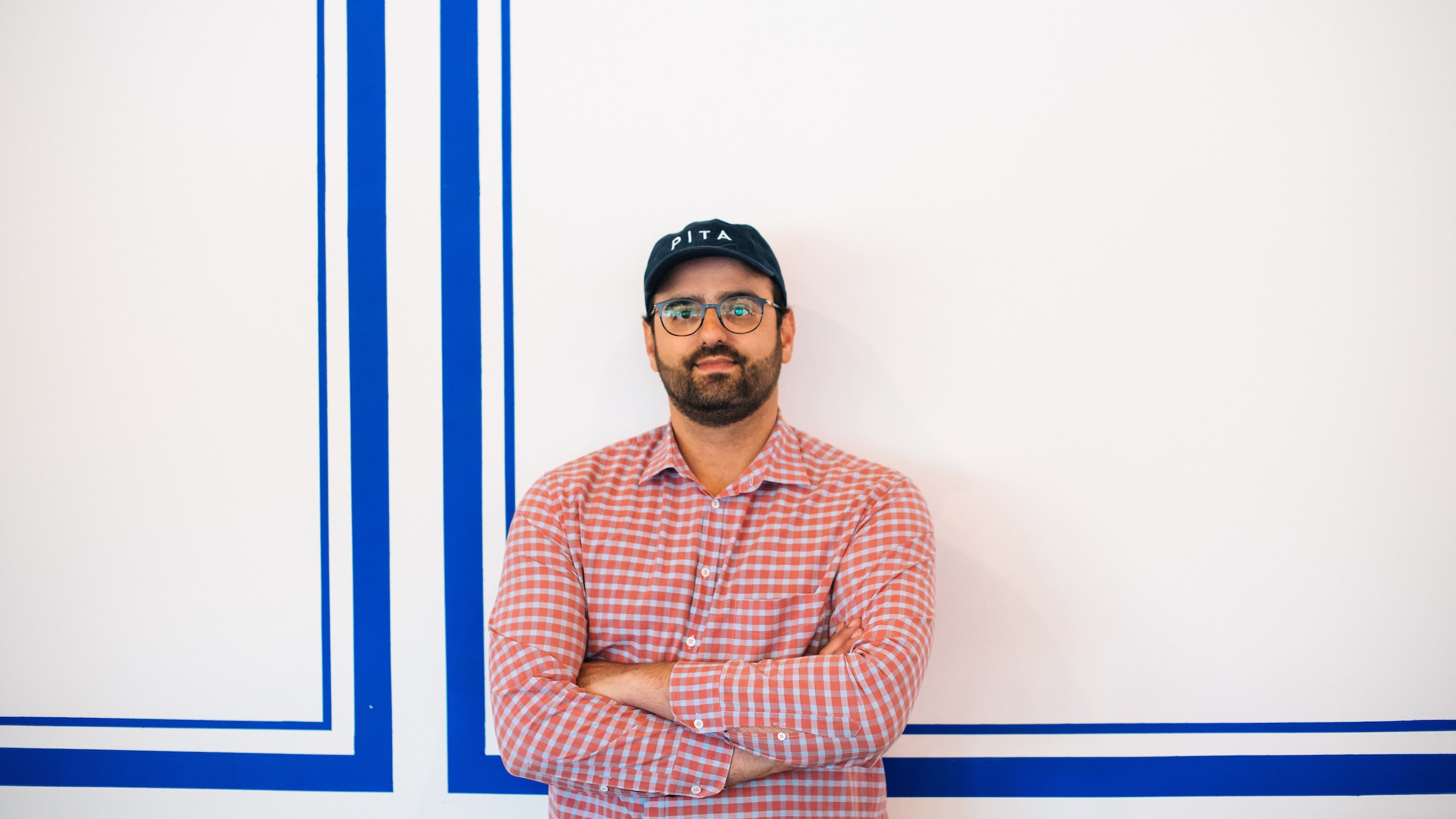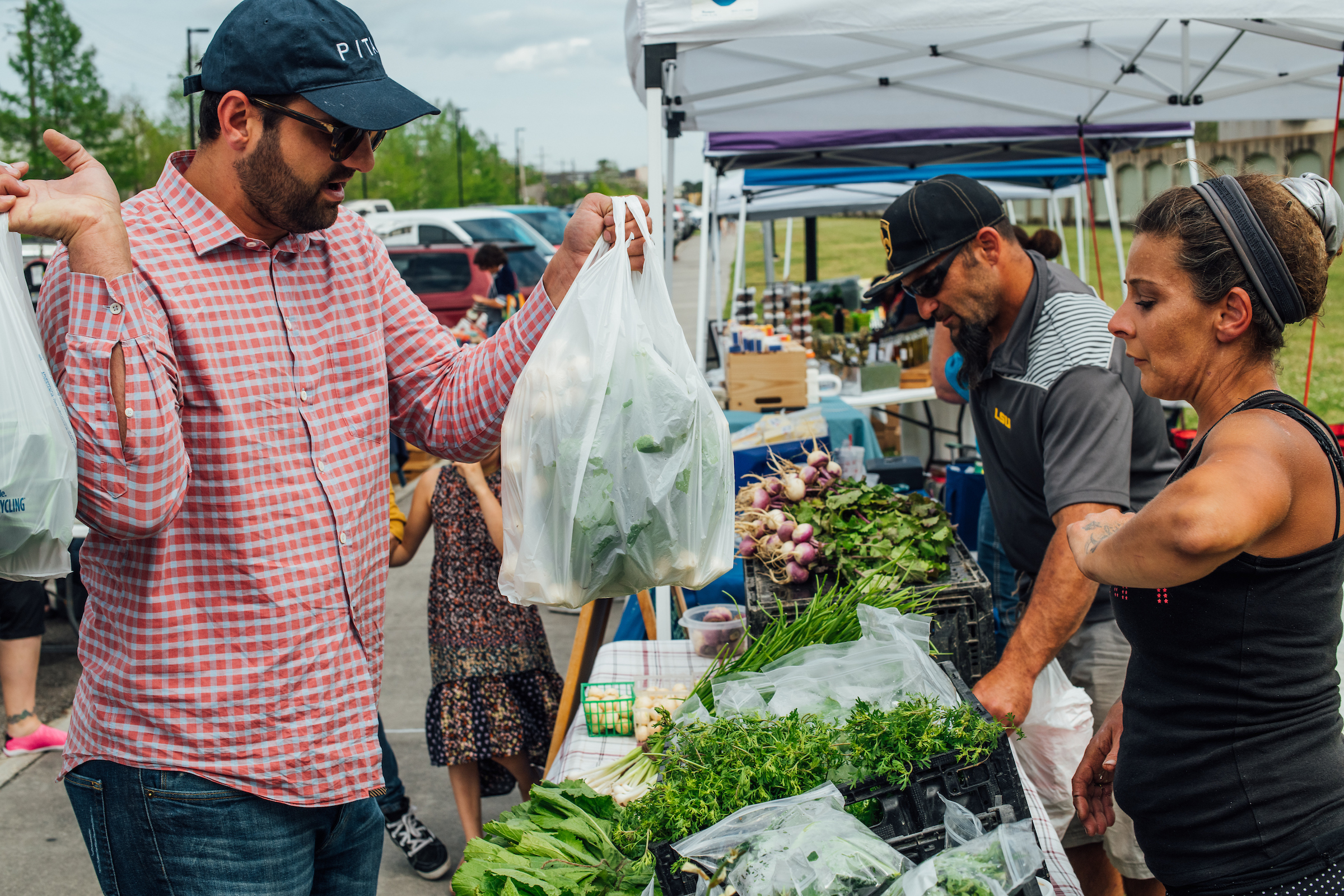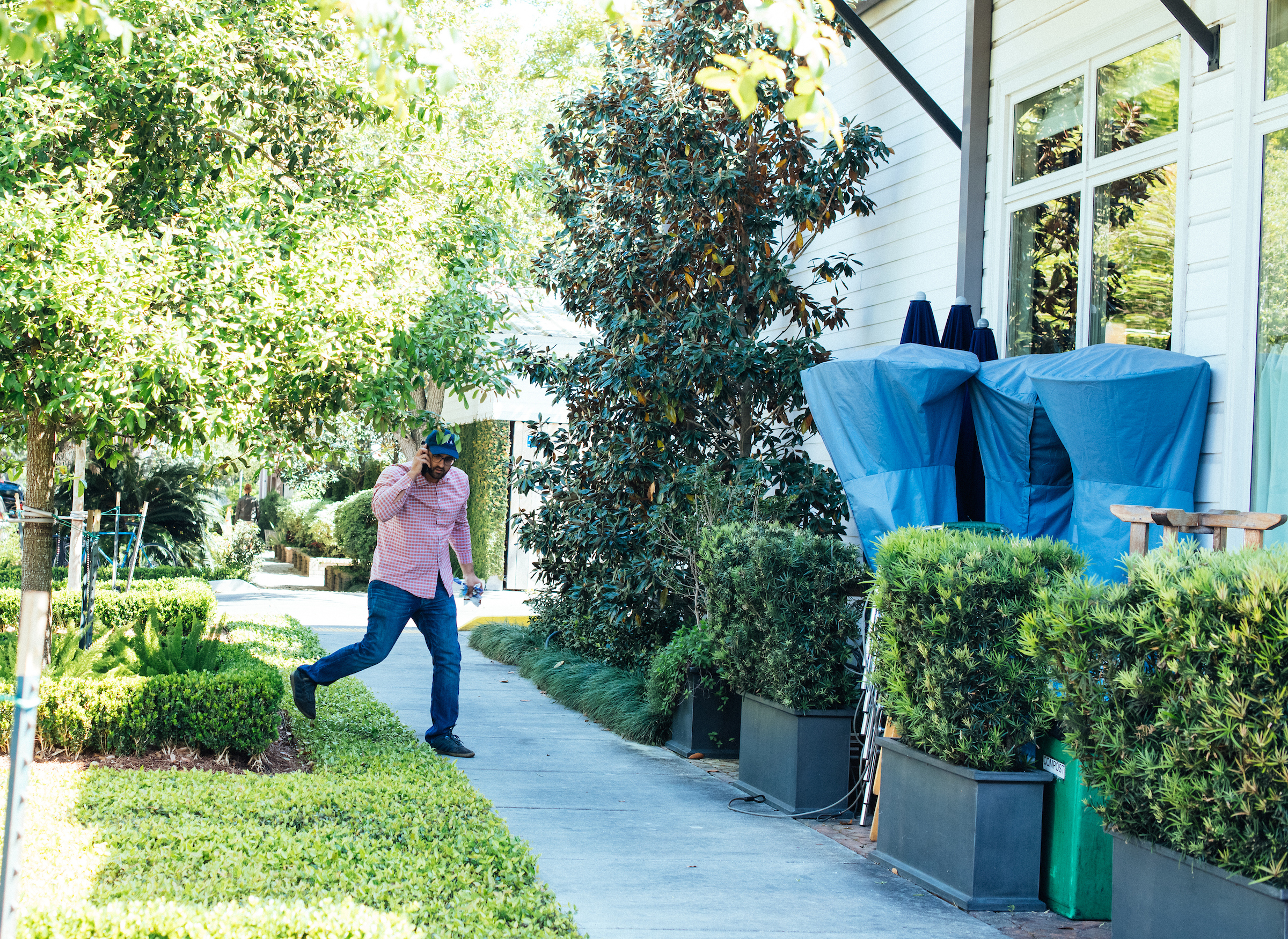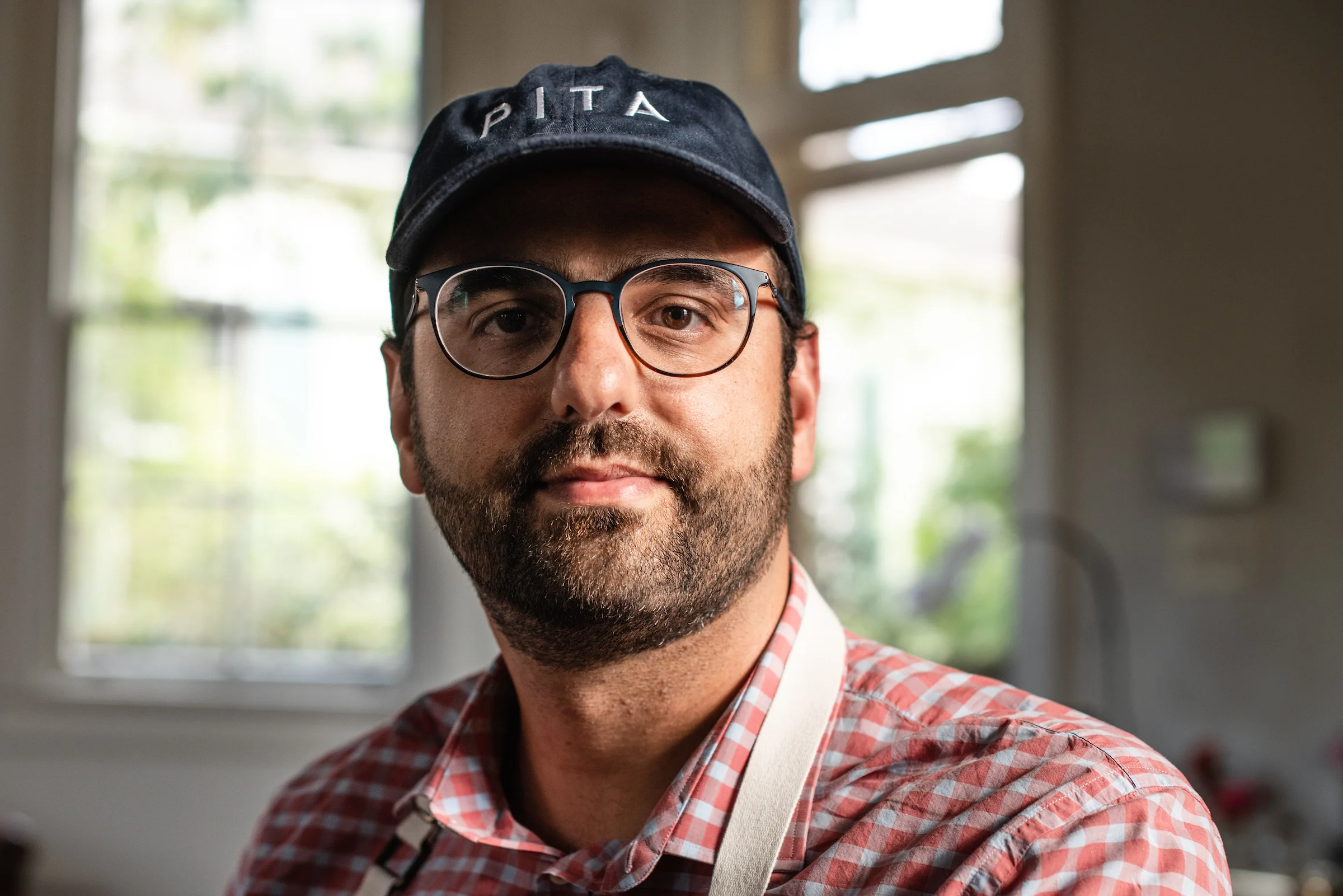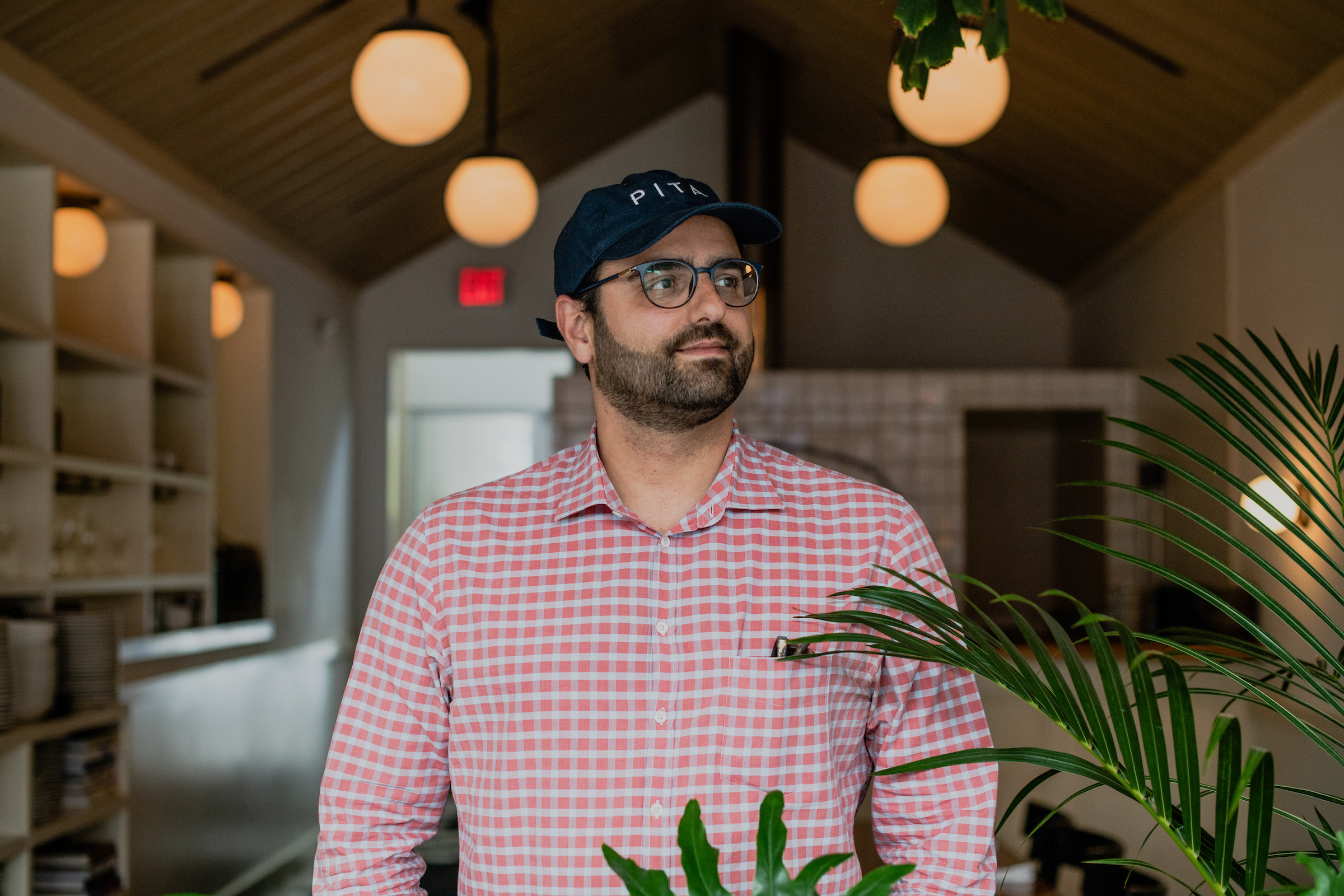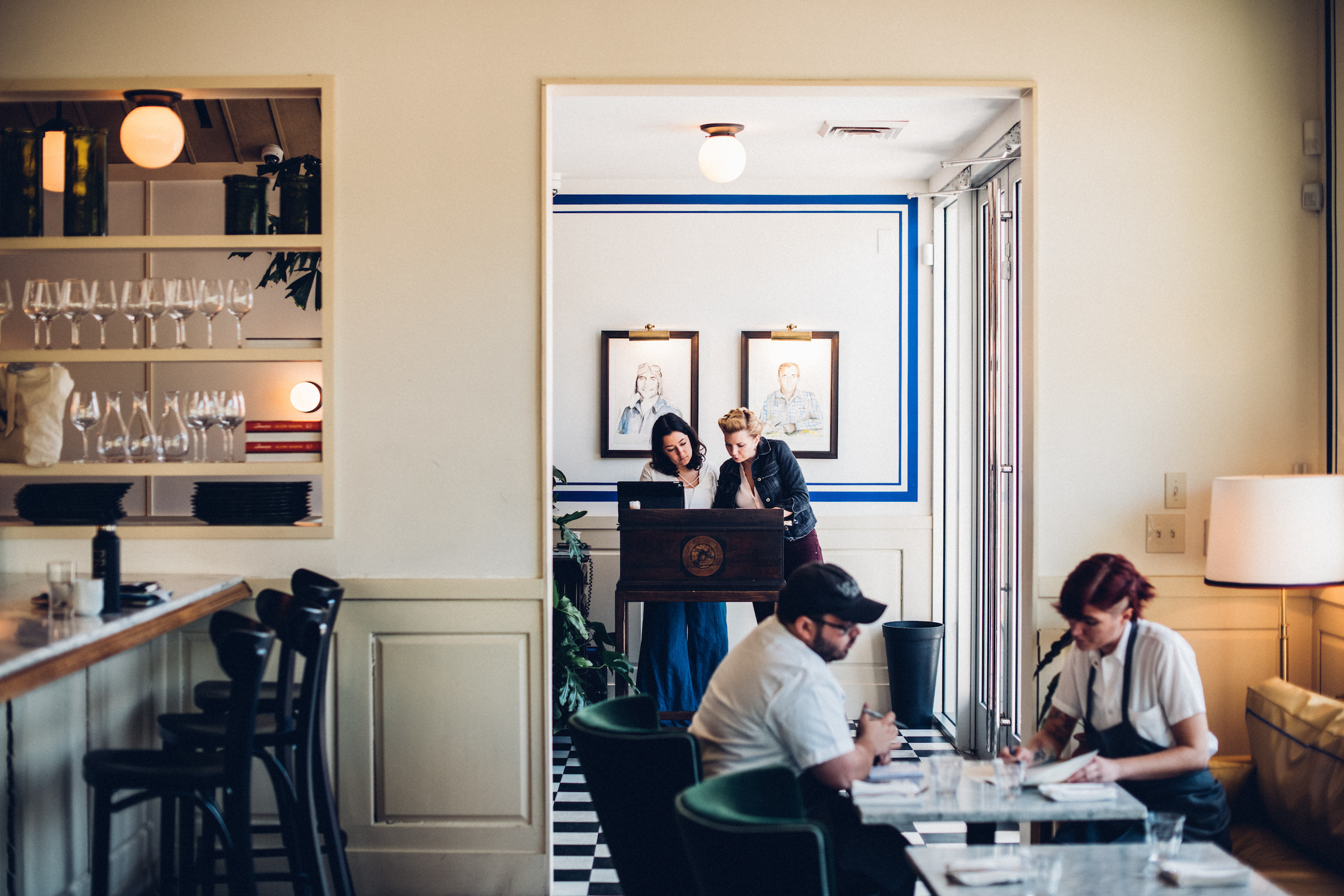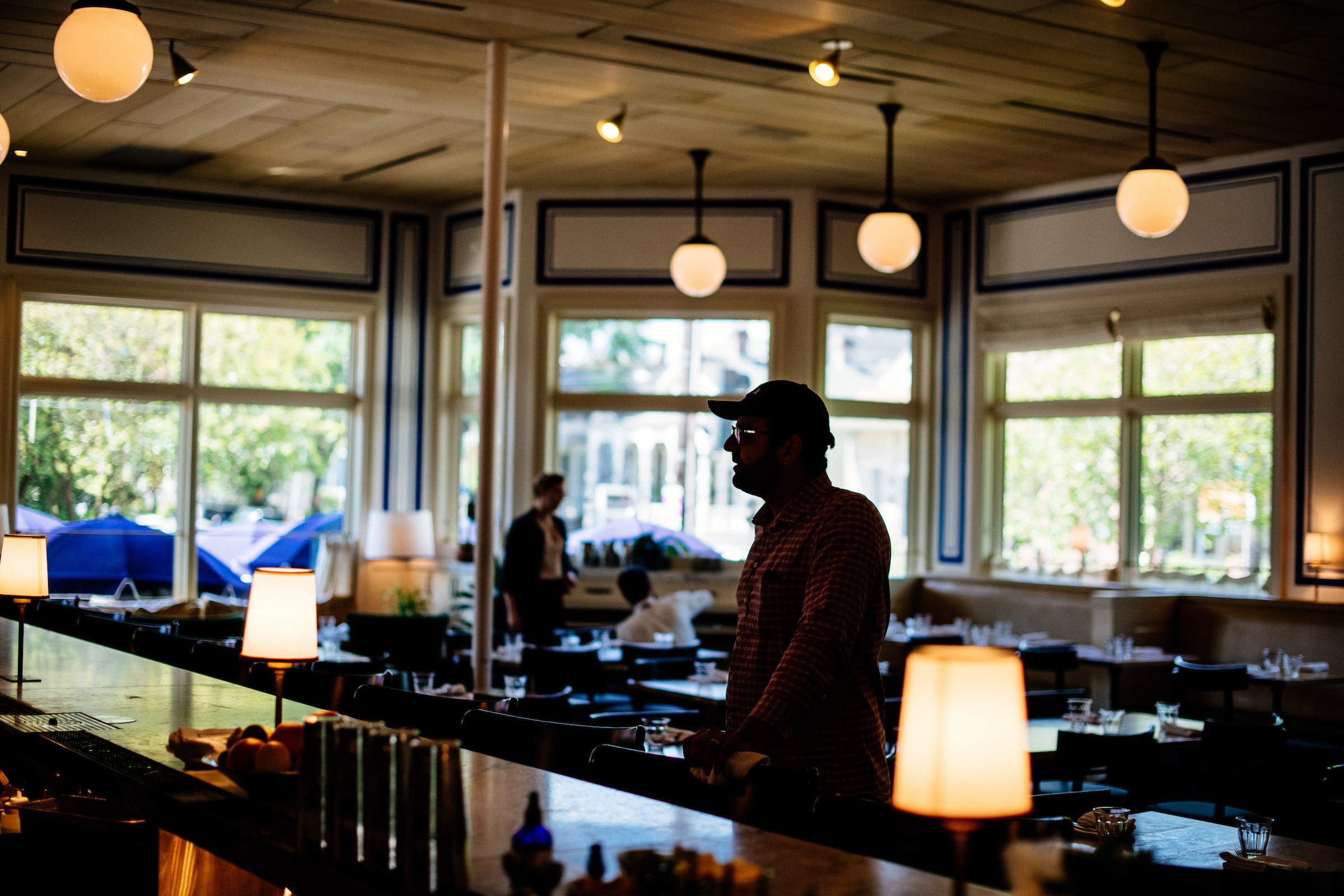Last year, Israeli-born New Orleans chef Alon Shaya lost a court battle to take his last name off the James Beard Award-winning restaurant he founded and later got fired from. He came back with a compelling cookbook/memoir, two new restaurants of his own — and a whole new approach to management in the aftermath of the #metoo movement. Now he thinks losing everything was a blessing.
It’s about half past noon on a Tuesday, and Alon Shaya is meandering through the Crescent City Farmers Market, next to the Mississippi River levee in his adopted hometown of New Orleans. The Israeli-born chef and his Georgia-born wife, Emily, are having friends over for dinner that night, and Shaya is assembling the ingredients for a feast.
With a just-bought tamale in one hand and a watermelon agua fresca in the other, he roams from table to table, shooting the shit with farmers, fishers, familiar faces — anybody who will take the time to listen. In baggy jeans, a worn T-shirt, and a baseball cap, he is clearly at home and frequently recognized in this carnival of growers and artisans.
Pausing in front of a table of hot chiles, he fixates on the so-called “rat-poison peppers.” They’re an antidepressant, he says. Bite into one, and here come all your feel-good pheromones.
Passing by a grass-fed-beef purveyor with a Sylvia Plath quote posing for an ad (“I want books and babies and beef stew”), Shaya stops to gab with a woman named Babs about the lamb-stuffed challah he plans to bake for the get-together. He calls it “Game of Thrones” Bread because it looks so lusty and primal. Babs allows she’s never even made challah. He gives her a tip anyway: “Put a little turmeric in the dough.” Adds a nice golden sheen.
An egg vendor with a Cajun accent and a sign for “Pickled PeeWee Eggs” stuck to the front of his table sees the chef approaching and shouts out a heads-up: “You ain’t going to like it. I’m only down to duck eggs.”
“I love duck eggs!” Shaya roars. He’ll take two dozen.
Alon Shaya loads up on ingredients at Crescent City Farmers Market in New Orleans, where he is a regular customer
By the time the chef approaches the shrimp lady, he is loaded down with plastic bags and egg cartons; one hand grasps a plastic bottle with just a swallow of pink juice at the bottom.
“Is your restaurant open in Colorado?” the shrimp lady asks. She’s obviously been following the news. “Is it successful?”
“Don’t jinx me,” Shaya jokes.
“And your wife hasn’t left you?” the shrimp lady teases, weighing out two pounds of shrimp for the risotto Shaya will cook for dinner. “Your wife will be happy that you fixed the shrimp.”
Ol’ Man River, that Ol’ Man River,
He must know something, but he don't say nothing.
He just keeps rolling, he keeps on rolling along.
— Jerome Kern, 1927
This is how my two October days with Alon Shaya begin.
Before heading off to the farmer’s market, he picks me up at my downtown New Orleans hotel in his dark-gray 2015 Jeep Cherokee. Cap pulled down over sunglasses, he rides slung-back style, as if he’s sitting in a comfy recliner: Easing on down the road, chillin’, taking in the day, surviving, thriving, happy, going places, movin’ on.
If Alon Shaya is stressed, if he’s anxious, if he’s blue, if he’s angry, he’s not letting it show. He may have had a challenging stretch, but he is intent on leaving all that behind and counting his blessings.
Before we get deep into the astonishing boy-makes-good, boy-loses-everything, boy-starts-over tale that is Alon Shaya’s, let me pause to say I’ve traveled from Atlanta to New Orleans to profile him for one honest-to-God reason: I think his cookbook/memoir, Shaya: An Odyssey of Food, My Journey Back to Israel, published last year by Knopf, the house that gave us Julia Child, Edna Lewis, and Laurie Colwin, is a beautiful and haunting tale of struggle and redemption that will stand the test of time.
And it doesn’t even cover his latest chapter: how he was fired by the Besh Restaurant Group (BRG) shortly before the #metoo movement caught up with the restaurant industry, and how he and Emily have since started their own company, Pomegranate Hospitality, and opened two new restaurants: Saba in New Orleans and Safta in Denver. (Saba and safta are the Hebrew words for “grandfather” and “grandmother.”)
I want to know more about golden-boy chef Alon Shaya — lots more.
Alon Shaya’s unmooring started at the tender age of 4.
When his parents moved from Israel to Philadelphia, it was as if his identity was split in two — like a walnut or pecan. It would take three decades to heal the rift.
Only after he began to cook the food of his beloved Bulgarian-Israeli grandmother, Matilda, and have people love it in return, did Alon Shaya feel whole again. With pita and hummus, he found his raison dêtre.
“I’m now cooking Israeli food because I’ve come to terms with my life,” he tells me as we glide from market to cheese shop to his home in Bayou St. John to drop off dinner provisions. “I’m not ashamed of it anymore. I’m not trying to sweep it under the rug and be something else.”
And yet for many years, he did wrestle with his past, even as he attended the Culinary Institute of America, became wildly ambitious, and worked his way up the BRG ladder.
Shortly after meeting Emily Ostuw at a mixer for Jewish singles in 2007, Shaya got a wild hair and moved to Italy for eight months. Since his earliest days in professional kitchens, he had felt an affinity for the food of Italy, and he wanted to go deep into the art of pasta, charcuterie, and pizza.
His rigor paid off. (And despite his fickleness, Emily stuck with him.)
Alon and his wife, Emily
In 2009, with Shaya as executive chef, BRG opened Domenica, a contemporary Italian restaurant in New Orleans’ Roosevelt Hotel. In 2015, Shaya won the James Beard Award for Best Chef: South for his cooking at Domenica.
By that time, he’d been perversely sneaking Middle Eastern ingredients onto the Domenica menu, and in 2015, again with the backing of BRG, he went full out-Israeli with Shaya, his first restaurant to pay homage to the food of his homeland.
In 2016, the James Beard Foundation smiled on the chef again, this time with a national accolade: Shaya was named America’s Best New Restaurant.
Bolting onstage at the Lyric Opera of Chicago, surrounded by his BRG family, Shaya told the crowd: “We are so blown away by this. Who would have thought, hummus in New Orleans? Give me a break. It’s like, what’s everyone thinking?”
And just like that, Alon Shaya, the kid from Bat Yam, Israel, who’d spent much of his youth getting in trouble, became one of the most famous chefs in America.
It was an intensely personal victory. He’d put his heart and his ego on the line, serving the dishes of his beloved safta; in return, the fresh, vibrant cuisine had been wholly embraced by his adopted homeland, the American South.
“He was on cloud nine that night,” says Emily, who moved to New Orleans in the early 2000s to study at Tulane University and is now Pomegranate’s director of new projects. “He was, like, floating around.”
Zach Engel, the Shaya chef de cuisine who would go on to win the Beard for Rising Star Chef in 2017, says his then-boss was so pumped he hung the medal on Engel’s neck and let him wear it around the gala.
“The funny thing about Alon, it’s not really about him, necessarily,” Engel told me in a telephone interview from Chicago, where he moved last year and recently opened his own Israeli restaurant, Galit. “He relished the fact that he brought a lot of people along with it.”
One person conspicuously absent from the stage on that gleeful Chicago night was John Besh — an ominous sign, in retrospect.
By all accounts, including documents filed by both parties in the U.S. District Court for the Eastern District of Louisiana, the Besh-Shaya relationship had already begun to deteriorate.
The damnedest thing about Shaya’s cookbook is it travels full circle from his Israel roots to the genesis of his first Israeli restaurant in New Orleans, then stops right before the shit went down, and things got real ugly.
The omission was not intentional. The book was created with the expectation that Shaya would still be running his namesake restaurant upon publication. I believe the absence of scandal makes for a finer, purer book, one that is untainted.
And yet, if you know what happened next, it’s a juicier read for what’s not in it. Besh is a major presence in the book, which often unspools like cinema, but he remains a bit of a shadow figure, too. When did the two stop being close?
The memoir more or less begs for another chapter — or as Shaya’s co-author, Tina Antolini, puts it, “an asterisk.”
Shaya and Antolini turned in their 26-chapter manuscript 10 months before he was fired from his executive chef positions at Domenica, its casual spinoff Pizza Domenica, and Shaya in September 2017. The following month, New Orleans Times-Picayune reporter Brett Anderson dropped a bombshell expose, in which 25 current and former BRG employees claimed they were victims of sexual harassment while working for the organization.
Though Shaya would later contend he was fired for talking to Anderson, BRG noted in court filings that he was dismissed before Anderson’s story was published (how would they know what it would say?), and that the feud had been simmering for years.
Shaya sued BRG for the use of his name but lost the battle in the spring of 2018. This was not long before his book was published and just before the opening of Saba last May, followed by Safta in August.
Shaya’s Saba and BRG’s Shaya sit a little more than a mile from one another on New Orleans’ Magazine Street — meaning that many customers still flock to Shaya on the assumption that they are eating Alon Shaya’s recipes. Often they are, although he is no longer associated with the restaurant.
The night before I meet the chef, I decide to check out the restaurant that made him famous. I’d never set foot in the place.
When I ask my server what she’s hearing about Saba, she says word on the street is it’s not so great now that Engel, Pomegranate Hospitality’s original culinary director, has left.
“He was the brains behind the operation anyway,” she says.
“Well, meow,” I think, as I pull warm pita through hummus.
Alon Shaya remembers the day the long-awaited finished copies of his new cookbook arrived at his doorstep.
“It should have been like one of the happiest days of my life or a very momentous occasion,” he tells me as we drive. “And it was literally like, ‘Oh, the book is here.’ ”
I ask him to go on.
“I was in the middle of one of the hardest times of my life. I had lost everything that I worked for. My wife and I were kind of like sitting there in shock, and like the book arrives, and like we literally couldn’t even. It was just sad because I wanted to be excited the day it came. But I just wasn’t.”
Sensing he’s given me an opening to press for more details about how the unpleasantness went down, he shuts the door.
“Let me preface by saying this: I can’t go into a lot of detail about my experiences, particularly at Shaya or Domenica or Pizza Domenica,” he says, “because I don’t want to spend more money on legal bills, and I would rather invest that money back into our team.”
One thing he will say:
“As hard as all that was, it was a blessing. As much pain as we had to endure, it was a blessing. For all of the friends that we lost, or people that we thought were friends and the people that we trusted that we realized that we couldn’t trust, it was a blessing. And my life and Emily’s life and the lives of all of the people that we embody have benefited from that experience because my focus and my attention is now in a more important place than it’s ever been in my entire career.”
He says he couldn’t care less about winning more James Beard Awards or acquiring material possessions. The reason he gets up every day, he tells me repeatedly, is to create a healthy environment for his team. He wants to empower them so they can do great work.
All this — the fact Shaya doesn’t want to talk about the controversy, his fears of further legal actions, his focus on spinning his narrative forward and staying on message about his new hospitality group — will make the telling of this story a bit conundrum for me when I get back to Atlanta and sit down to write it.
So now what?
Naturally, we do as you do in New Orleans. We go to lunch. We eat some great food. And we dance around the big turd in the punch bowl.
Today, Alon Shaya feels as rooted in the Big Easy as the magnificent oak trees that line St. Charles Avenue. (“Alon,” it just so happens, means “oak tree” in Hebrew.)
He’s lived here since June 2003, when he moved from St. Louis to run the 24-hour buffet at Harrah’s New Orleans, a job that required him to manage 400 employees. His biggest pain may have been dealing with the buffet’s erratic chocolate fountain. As he writes in his book, it was forever clogged up with strawberries and pretzel rods, to the chagrin of “elderly female customers.”
In 2005, he became chef de cuisine at Besh Steakhouse, also at Harrah’s. (Besh, Shaya clarified in an email to me, was a consultant for the steak joint, owned by Harrah’s. Shaya didn’t officially work for BRG until late 2008 before the opening of Domenica.)
Shaya adores New Orleans — the fried chicken, the po’boys, the Vietnamese food, the bounty of produce, the sports teams, Mardi Gras.
He may have grown up in Philadelphia, but he and Emily are Saints fanatics. During this past NFL season, Emily walked into a bar wearing a leopard hat. The Saints were losing, so Shaya put the hat on, for fun. After the Saints won the game, the couple decided the leopard chapeau was the lucky charm, so the chef wore it to two playoff games. But a controversial call cost the Saints a chance at Super Bowl LIII in Atlanta.
“Now I think it may be bad luck,” Shaya jokes about the hat.
When I make a comment to Shaya about the Southern “piece” of his journey, he corrects me.
“I feel like I’m Southern,” he says. “It’s not a ‘piece.’ Southern is my life right now. I don’t make any qualms about it. I feel more connected to the South and to the people and to the culture and the history than I’ve been connected to anything anywhere else.”
Indeed, every Monday night, the Shayas follow the Big Easy tradition of cooking red beans and rice, and the couple’s tight circle of friends pile into the rambling Orchid Street bungalow they share with their two dogs, Henry and Ceci. (“Ceci” is Italian for chickpea.) A photo of such a gathering is on the cover of Shaya’s cookbook.
For Shaya, though, red beans and rice is more than just a pot of legumes simmered in pork. It is a dish fraught with emotion.
In his book, he describes serving it to victims of the levee failures during Hurricane Katrina in 2005 — a moment of reckoning that cracked him wide open and made him feel empathy for his drowning brothers and sisters. It made him feel like he was needed here, that he belonged.
Later, Besh asked him to fix lunch for a group of volunteers from Oxford, Mississippi, who were helping rebuild a fried-chicken restaurant in the Seventh Ward that Shaya had never been to.
“The jambalaya might not have had much sentimental value for me,” he writes. “But it meant something to them. This must be some kind of church group, I initially thought. But it turned out the gospel they were preaching was one of Southern food. There were from a nonprofit called the Southern Foodways Alliance.”
The restaurant was Willie Mae’s Scotch House, which earlier that year had been named an America’s Classic by the James Beard Foundation.
“When I was there at the job site, serving them lunch, I had that feeling again, the one I’d had with the red beans: that what I was doing mattered,” Shaya wrote.
Because the Shayas were busy opening two restaurants before my visit, they haven’t had a lot of time to do their Monday night red beans-and-rice ritual with friends. And this being a Tuesday, they aren’t going to fake it, not even for a reporter.
“Hi, sweetie,” Shaya calls out to his wife, as we walk through the house and into the big open kitchen with two dining tables off to one side and a large painting of a pig over the stove.
We’ve stopped to unload dinner fixings and managed to interrupt Emily’s lunch — she’s munching on a salad. The Shayas’ dogs are with friends in Denver, where the couple has been spending most of their time, trying to get Safta open.
After catching up with Emily, the chef heads out the backdoor to check on his Big Green Egg. He opens the lid, and poof: Smoke billows up from a rack of lamb shanks, which he pulls off the smoker and takes into the kitchen to chop for the challah. (There is also pork that will later get pulled into pieces and stuffed in a big orange pumpkin.)
After some discussion about where to go to lunch, we head out to Compere Lapin in the Warehouse District: Shaya is in the mood for some of his friend chef Nina Compton’s Creole-meets-Caribbean food. Before leaving, he runs down the night’s menu and asks Emily if she’ll peel the shrimp and use the shells to cook a stock for the risotto while we’re out. As we drive, Emily calls to ask if she’s making the stock the way the chef wants it.
“Hey, sweetie,” he says each time he picks up. “No, you don’t have to roast the shells. Just water and veggies.”
At 40, Alon Shaya is a big lumbering guy who exudes the confidence of a person who’s at once comfortable in his own skin and as goofy as the cartoon character Gumby. He is earnest. He is kind. And according to those who know him best, he is naïve to a fault.
Should you ever meet him, he is likely to greet you with a long, sonorous “Helloooooo.” The way he stretches out the “O” into a gentle lilt seems purposefully calibrated to put you at ease — it’s better and gentler than a handshake.
With his owlish glasses and thickly upholstered but neatly trimmed beard, he exudes the happy energy of a puppy dog who insists like me, like me, like me. You get the impression he has always needed affection and always wanted to please people. You see this in the way he greets his Saba customers.
And yet, early in life, he developed a knack for mischief, too.
As we drive, I ask Shaya if he has any recollections of his toddler years in Israel. He tells me about a lady who lived in the same apartment building as his family.
“I have an image of running up the stairs away from my mom when she was disciplining me to go to my neighbor’s house,” he says. “She (the neighbor) would close the door on my mom and just sit there and feed me candy the whole time.
“My mom hated her.”
When he and his mother traveled to Israel in 2003, they stopped by their old building and knocked on the friend’s door. To their surprise, she still lived there. “She opened the door, and she just started crying.”
As he relates the story, he seems moved by the sweet memory.
I ask him if he still has a sweet tooth, and he jokes he has an “everything tooth.”
Alon Shaya has been acting out for as long as he can remember. “I was a real shithead as a kid,” he tells me.
En route from Israel to America, the 4-year-old caused a ruckus on the plane. “I got in trouble,” he writes in his book, “for stealing sodas — more than half a dozen different cans — from the galley and hiding them under my seat.”
By 5, his parents had split.
His mother, Aliza, had to scrape together a living by working two jobs. His sister, Anit, five years his senior, was frequently out of the house. As he got older, he spent a lot of time alone and unsupervised. He experimented in the kitchen; he experimented with drugs.
“I fell in with a rough crowd when I was in the eighth grade and began smoking cigarettes and weed, hanging out with drug dealers and older kids who carried guns,” he writes in his book.
Describing himself at that age, he tells me: “I’m like this 6’1” hairy kid, and I’m just doing like what the hell I want. I think a lot of people never really tried to stop me. I think they had just written me off.”
One time, he stole his mom’s car and went on a joyride to Atlantic City. He guzzled 40-ounce bottles of malt liquor, shoplifted, walked out on restaurant tabs, and got pulled over at 3 a.m. — for driving with his headlights off.
“They took the car away, and my mom had to come pick me up with her boyfriend’s car,” Shaya says. “She was pretty pissed off.”
Another time, he and his stoner buddies were arrested for trashing the kitchen of the home where they binged in the basement. Malt-liquor bottles and bongs were brought before the judge as evidence. Shaya remembers sitting in court next to a giant bong they’d made from an old pretzel bucket.
A few years later, he almost got kicked out of the Culinary Institute for slashing the tires of a classmate who pissed him off. He used his fish-filet knife to do the dirty deed.
“I’ve matured, unfortunately,” he remarks slyly when I bring up that episode.
When I ask him if he was bothered by his misbehavior, he says: “I think I was constantly embarrassed and constantly humiliated and constantly kind of searching for an identity.”
Shaya started to change when he signed up for a home-economics class — on the pretext of meeting girls — at Harriton High School in the Philadelphia suburb of Lower Merion Township.
Instead, he encountered Donna Barnett, the teacher universally credited with helping him get his life back on track.
Barnett tells me there were some at the school who thought the menacing, hirsute 14-year-old shouldn’t be allowed to slice an onion. “My own faculty took me aside and said, ‘You are a fucking idiot for putting a knife in his hands,’” Barnett says. “It’s hard to believe because he’s such a kind, gentle, wonderful man, but in high school, he was a big, very angry guy.”
She noticed right away that her mouthy student had a flair for arranging fruit — “his platter was unbelievable!” — and a sharp palate.
“If I was making something, he was one of the few students who could discern a flavor,” Barnett says. “If he tasted it, he could say, ‘Oh, you’ve got oregano in here, or basil.’” She soon worked out a deal with the principal to bring the boy to her when he got in trouble, rather than sending him to detention.
“What the hell did you do this time?” she’d ask her charge.
“If I thought his behavior was egregious, he would chop onions,” Barnett says. She felt it was a good way for him to work out his aggression.
“But if I believed the teacher was just being kind of a jerk, then we would test kitchen recipes,” she adds. She later learned the student got in trouble on purpose so he could hang with her.
Barnett’s influence over Shaya was unlike anyone else, including his divorced parents. She could cut through his bullshit and make him focus.
“I really think Donna’s belief and trust in him to do things changed his vision of himself,” says Antolini, who spent countless hours interviewing Shaya while writing the book. “I really feel like that was the pivot point in his life, of having Donna recognize what he was good at and really shepherd that.”
In cooking, Alon Shaya had found a mooring for his lost soul. He had found what validated him.
“When he fed someone, and they tasted it, and they said, ‘Oh, my god, that’s amazing,’ he felt valued as a person,” Barnett says. “He felt like this is valuable, and I am valuable.”
Barnett got the idea her star student should attend the Culinary Institute of America in Hyde Park, New York.
“I believed in my heart he would not succeed in college — not because he wasn’t bright but because it wasn’t his interest — and that I had to get him into culinary school,” she says. “For this child to move forward, he had to go to culinary school, and I knew the best school, in my opinion, was the CIA.”
She helped Shaya get a job in a restaurant owned by one of her friends, and “made sure he had a collared shirt and dress pants and a way to get there.”
One day, while watching a chef make a pizza at the restaurant where he worked, Shaya had a revelation.
“I got a funny feeling looking at that pizza,” he writes in his book. “It was as if I’d just kissed a girl I had a crush on. The pizza made me realize that this work, cooking, didn’t have to feel like a job. It could be my life, the thing I loved to do. I called Donna as soon as I could after my shift. ‘I’m going to be a chef,’ I told her. ‘I want to be a chef.’”
“I used to chase his mother down the hallway whenever she came into an open house or because of behavior,” Barnett says. “I’d say, ‘We have to get him into culinary school! We have to get him into culinary school!’”
The charred eggplant with tahini and pomegranate is a menu staple at Saba
As we drive, Shaya talks about the Shaya Barnett Foundation, which he and his mentor established in 2016 to help bolster culinary education in high schools. They partnered with New Orleans’ Edna Karr High School to buy kitchen equipment and help write the curriculum for the culinary program.
“When I retired,” Barnett says, “he called me and said, ‘Listen, I want to do for kids what you did for me. Will you, please? Let’s start a foundation.’”
Over the years, Shaya turned again and again to Barnett, his great champion, when he needed support. Barnett recalls the time in 2017 when Shaya and his mom were visiting her and her husband at their Margate, New Jersey, beach house.
“He told me, he said, ‘Listen, you know what’s going to break about John Besh is going to be as bad as Paula Deen. I don’t want you to be afraid for me. I’m going to be okay. But, you know, it’s going to be bad.’”
“I flew down to work on Edna Karr,” Barnett said. “So I was with him and Emily not the day but the week that they fired him.”
We will spend our days together in a place where everyone feels comfortable and safe. We will create a space, whether in our restaurants or throughout our community and beyond focused on furthering love, mutual respect, and professional fulfillment.
We will stand up for and uphold values of equality for all people no matter the circumstances.
We will surround ourselves with people who share in these values.
Then, we will cook and serve, and be happy.
This is the mission statement of Alon and Emily Shaya’s Pomegranate Hospitality. It’s what you read should you enter through the back door, the employee entrance, of Saba. (The same statement can be seen from the Safta dining room, over the entrance to the kitchen, as you walk through the front door.)
Next to Saba’s host stand, to the right of the entry, are elegant watercolor portraits of Irving Ostuw (1919-2013) and Nissim Djerassi (1923-2002): “Emily’s granddad” and “Alon’s Saba,” according to the labels written underneath.
The main dining room at Saba in New Orleans. Saba is Hebrew for grandfather, and portraits of Emily and Alon's beloved sabas hang in the foyer
Born in Passaic, New Jersey, Emily’s grandfather moved to Calhoun, Georgia, at 19 to manage O’Jay’s, his uncle’s chenille-bedspread factory. For a time, he lived in a boarding house, where he fell in love with Elizabeth “Lib” Ingle (1920-2013), whose mother ran the place.
After marrying Lib, who converted to Judaism, Irving served as U.S. Army Air Corps fighter pilot during World War II. “He killed a lot of Nazis,” Shaya tells me of his wife’s grandfather.
According to Irving’s obituary, “Captain Ostuw would fly 135 missions; log 370 combat hours; be recognized as having the ‘Most Buildings destroyed’ with 75 by Major General Hoyt Vandenberg; receive three Distinguished Flying Crosses; 24 Air Medals and the illustrious Silver Star before being relieved of service in November of 1944.”
He fought in the Battle of the Bulge and D-Day.
Like Emily’s grandfather, Alon’s Bulgarian-born saba was a war hero, too. After narrowly escaping the concentration camps of World War II, Djerassi fled to Israel, where he fought in the 1948 War of Independence. After he ended up with shrapnel in his leg, he met his wife, Matilda. As Shaya expresses it in the book, she was “the beautiful Bulgarian pharmacist who would later become my grandmother and teach me how to cook.”
His grandfather later became a taxi driver in Jaffa, and Shaya recalls zipping around with his Camel-smoking saba, listening to Wham!’s “Wake Me Up Before You Go-Go.”
He remembers it “like it was yesterday,” he tells me wistfully.
Alon Shaya may have had a fucked-up childhood, but he was fortunate enough to have wonderful grandparents. His happiest boyhood memories are of arriving home from school and discovering that his safta was visiting from Israel.
Matilda Djerassi would char eggplants and sweet peppers over an open flame for her lutenitsa, a sweetly concentrated stew that can be scooped up with pita. (Shaya now calls it Bulgarian ketchup.) She’d fix cabbage rolls, filled with ground beef and rice and stewed in tomato sauce; stuffed grape leaves; chopped liver mixed with hard-boiled egg and red onion; bowls of cucumber and herbs in yogurt; slices of fried eggplant smeared with garlicky tomato paste; latkes.
Her crafty young grandson would feign a fever by hiding a thermometer beside a steaming hot radiator. That way, he could stay home and have his safta make some of her creamy tomato soup.
He loved that food because it made him feel like he had a family. On that 2003 trip to Israel, just before his safta died, he spent a week with her, learning her repertoire of recipes. But when he returned to the states, he was too busy doing the corporate chef thing to get serious about Israeli food.
When BRG opened Domenica in 2009, New Orleans was a meatball-and-red sauce loving town, so Shaya’s cured meats, wood-fired pizzas, and hand-rolled pastas felt fresh. In this sea of Creole-Italian lovers, Domenica was a hit.
“Domenica really was the first restaurant in New Orleans to just nail that one on the head,” Anderson, the Times-Picayune's longtime features reporter and restaurant critic, says of Shaya’s polished Italian cooking. “That really was a moment where Alon kind of seemed to make a name for himself within the Besh Restaurant Group.” (Earlier this month, Anderson and the rest of the Times-Picayune's editorial staff were laid off after the 182-year-old newspaper was purchased by a competitor.)
By and by, Shaya started incorporating Israeli flavors into the Italian food at Domenica — maybe lamb Bolognese on a bed of tahini with za’atar crostini, or duck-liver pate with charoset, a fruit-and-nut paste traditionally served at Passover, or shakshuka topped with roasted peppers, olives, and goat meat. Customers were hooked.
Wasn’t it time he accepted his heritage and opened a restaurant serving the bright, earthy flavors his safta had taught him?
In 2011, on a trip to Israel, Shaya and Emily became engaged. (They were married at John and Jenifer Besh’s home the following year.) After that, he revisited the notes he had taken while cooking with his late safta, and a vision for Shaya began to emerge.
By this time, we have arrived at Compere Lapin. In the spirit of bonhomie, we decide to start with a Centennial Punch made with Louisiana rum.
“A little punch never hurt anybody,” Shaya says.
It turns out to be a mix-it-yourself setup: a bottled cocktail, a pair of heavy, cut-crystal glasses filled with ice, a fancy swizzle stick for stirring the drink, and limes.
“It’s fun,” says Shaya, using both palms to rotate the swizzle-stick gizmo. He takes a sip. “Oh, that’s intense! I’m not going to be able to drink all that!”
As the meal progresses, he reflects on the lessons learned since he got fired and talks about the structure of Pomegranate Hospitality, which has eschewed the traditional hierarchy of restaurants in favor of a team approach.
When I ask him if the philosophy is a result of the toxic culture in his previous job, he bristles slightly. (It’s the only moment in our two days together that I detect a glimmer of defensiveness or sarcasm.)
“You can’t think of it as like a light switch. Like ‘Oh, now I know what toxic culture is.’ That’s not the way it goes. I always knew what was really important to me, and I knew what was the right thing to do. I didn’t want to keep standing by when I knew that things could be better. ...
“How I managed that has been a culmination of successes and failures. There are things that I regret not doing earlier — or saying earlier. Or standing up (about) earlier.
“At some point, you need the team to be around you to truly live up to the potential. And when the team around you and the people that have power and money and influence around your businesses aren’t there right alongside you carrying that torch, it says that things need to change.”
Alon and Emily meet have a team meeting with (clockwise from upper right) Pomegranate Hospitality communications director Meredith Dunbar; Saba chef de cuisine Cara Peterson; Saba general manager Jessica Retif; Pomegranate director of people and culture Suzi Darre; and (behind the plant) Saba catering and events manager Kara Fisher.
Though Shaya has managed to avoid the sort of controversy that engulfed Besh and move on with his career, the Times-Picayune investigation raised eyebrows, to say the least. Anderson’s article details explicit allegations of sexual harassment at Domenica and Shaya while Alon Shaya was executive chef.
In a series of interviews, people close to Shaya told me he was profoundly upset by the revelations. They point to the Pomegranate philosophy of caring for its employees as proof of his commitment to change restaurant culture.
“I honestly don’t think in my heart of hearts that he knew all the stuff that was going on,” Donna Barnett says. “I think there is a naiveté to Alon in some says, and I think when he found out, he was pretty shook. Based on what I know, he went off alone and was fishing and was riding his bike a lot, and I think he was shaken to the core.”
Antolini, Shaya’s co-author, says she had concerns about the allegations in the Anderson article but that she’s since been “impressed” by Shaya’s efforts to change the way he operates restaurants. “To whatever degree we can’t know what he knew or didn’t know,” Antolini says, “the action that he’s taken has been like ‘This needs to be fixed.’”
In a lengthy interview, Anderson said he feels Shaya has taken the crucial steps of expressing his contrition and promising to do better.
“I believe that at least in the way he has spoken publicly and in the way that I believe he’s trying to hold himself accountable, Alon has to my mind taken the steps that we would want someone to take,” Anderson said.
In the aftermath of his investigation, Anderson has continued to pursue leads about misconduct at restaurants around the South.
“As to Alon himself, I can tell you I have not been able to find the instance that I can verify journalistically that would paint Alon in a worse light than he’s already been painted in,” Anderson said. “Believe me, I have put a lot of man-hours into trying to follow the crumb, and the public record is what it is. I haven’t been able to find it.”
Over lunch, Shaya tells me, “I realize the mistakes that I have made in the past that contributed to an environment where people didn’t feel as empowered as they should. People didn’t feel like they could communicate as much as they could, but again, it takes the entire team to build that structure.”
Emily Shaya says Pomegranate policy ensures staffers have access to managers.
“Whether it’s a server who needs to talk to the owner or the chefs, there’s always an opportunity for that,” she says. “When people come on board, we ask them: ‘What’s working for you? What’s not? What could be done better?’”
Saba and Safta are closed two days a week to give employees time to rest. The restaurants hold Thursday sessions where team members can teach or share information they feel passionate about.
After lunch at Compere Lapin, Shaya and I stop by Monday Mingle at Saba, organized by a team member in recovery. A buffet of dips and salads from the Saba menu is laid out on the bar. A massage therapist has set up a station in a corner of the dining room for neck rubs. Emily and Alon work the room.
Emily Shaya, who has a master’s degree in business from Tulane, says her own saba Irving inspired the Pomegranate management style.
“My grandfather was an entrepreneur,” she said. “They took care of their employees very well, which I think was not in vogue at the time among his compatriots. Just taking care of one another, treating each other with respect, being accountable. All the things you expect from those you look up to.”
Around 7 p.m., I arrive at the Shayas’ house for dinner. Friends from the couple’s Monday night red-beans-and-rice klatch have gathered around the kitchen island for drinks and snacks while the chef puts finishing touches on the meal.
He pulls out a tray of fresh mozzarella baked in satsuma leaves from the trees in the front yard, a trick he says he learned in Italy, where he used grape leaves. In the oven are the two shiny golden coils of “Game of Thrones” challah that he told Babs about at the market. There’s a big green salad with artichokes and tuna. And the chef’s piece de resistance is brought in: that whole pumpkin, filled with greens and ham hocks and smoked on the Big Green Egg. He will later post the show-stopper on Instagram.
Out of the oven comes a bubbling casserole of shrimp and satsuma risotto. In this instance, I can see that the smart-alecky shrimp lady at the morning market was prescient: The chef’s wife is indeed happy he cooked the shrimp.
After dinner, Shaya shows me around the lower level of their home. He points to keepsakes: his safta’s lovely paintings and a framed cartoon of one Alonzo Garbanzo; his dog Ceci; and Sharkshuka, a “Jaws”-worthy fish holding a skillet of eggs in tomato sauce.
In one corner of the living room, beside a cart holding a turntable, is the James Beard Award Shaya won for his work at Domenica. He turns it around to show me that the frame is slightly splintered in back.
It seems Emily stormed into Domenica and ripped it off the wall one night. Such are the spoils of war when chefs fight.
What about the Beard he earned for Shaya?
“The other one doesn’t have my name on it,” he says. “It just says ‘Best New Restaurant.’”
I shoot him a look that says, “You’ve got to be kidding me.”
Then it hits him. “Oh, yes, it does.”
Shaya, the restaurant that made Alon Shaya famous and still bears his name, endures. Wisely, and for the sake of his own peace of mind, he has chosen to move on without it.
Wendell Brock has written three profiles for The Bitter Southerner. This is the second one to focus on an immigrant who is changing the food culture of the South. In 2016, “The Woman Who Ate Atlanta,” his profile of French-born food critic Christiane Lauterbach, won a James Beard Award for profile writing.

